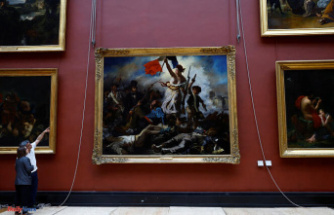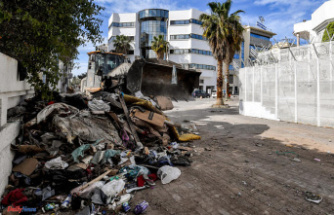In an ideal world, there should be four, five, six, or even more. Because in a public hospital as important as Beaujon, in Clichy (Hauts-de-Seine), on the edge of the capital, the psychiatric needs are numerous, and often complex to treat.
But in real life, in the corridors and staircases of Beaujon, thirty-year-old Jamal Abdel-Kader is alone. His title ? Mobile psychiatrist. In a public establishment where psychiatric reception conditions have deteriorated due to insufficient resources, he must get by, accompanied by interns from the department of psychiatry and addiction.
Author of two noted documentaries, filmed in the South of the United States (Southern Belle, in 2018, and Ghost Song, in 2021), Nicolas Peduzzi immersed himself for more than two years in the bowels of Beaujon, following step by step , closest, Jamal Abdel-Kader.
The camera seems almost glued to the back of this shrink in sneakers, always moving. Between visits to patients with serious pathologies, with whom he knows how to take the necessary time, and lucid discussions with the interns or one-on-one time with a nurse who also talks to him about his discomfort, everything goes well, and Jamal still seems available.
In the storms of everyday life
Between two camera movements, the beautiful black and white photos of Pénélope Chauvelot offer a welcome breath of fresh air while the original music of pianist Gael Rakotondrabe envelops this dive into the hospital in a very particular atmosphere, oscillating between melancholy and nervousness.
If this long-running documentary is a success, the personality of the young psychiatrist naturally has a lot to do with it. Composed, calm in the storms of everyday life, clear in his words, endowed with a solid sense of humor and not fooled by a system which, by cutting back on resources, dehumanizes the relationship between caregivers and patients, the psy mobile reveals a character that commands admiration.
Jamal is therefore alone, in Beaujon, to treat patients requiring psychiatric care. And this loneliness weighs on him. So he talks, a lot, explains his job, the difficulties, the sometimes dashed hopes of a hospital that would finally give itself the means to treat patients well.
He speaks to his drug addict, suicidal and alcoholic patients, often finding the right words to calm anxieties that we can imagine are terrifying. “At first I wanted to be a surgeon. Then I discovered psychiatry. I wanted to do something more political, more social. And psychiatry is exactly that,” he summarizes in his calm voice.
What place should be given to this type of patient in the public hospital? What are the ways to treat them properly? “What I do is not predictable or quantifiable. I don't know how long it will take me to build a bond and appease a person, appease their family. »
Jamal is lucid about the lack of resources put into psychosocial rehabilitation care. But the fight continues, even if the after-effects – “I have back pain, I’m like an old man” – are felt on a daily basis.












